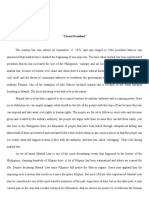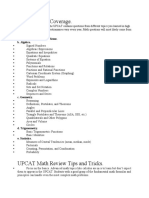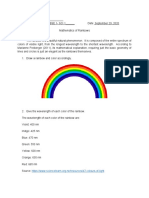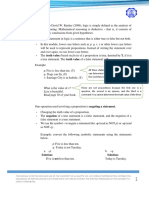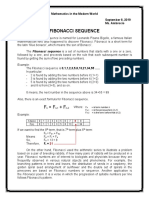0 ratings0% found this document useful (0 votes)
777 viewsA. Identify Whether The Following Statements Are TRUE or FALSE. ANSWER Answer
1. This document contains an evaluation activity for a mathematics course that evaluates understanding of mathematical language and expressions.
2. The activity contains multiple choice and true/false questions about mathematical statements and the use of variables. It also contains exercises to translate word problems into mathematical expressions.
3. The final section identifies different types of mathematical statements such as universal, existential, and conditional statements.
Uploaded by
Math TangikCopyright
© © All Rights Reserved
Available Formats
Download as DOCX, PDF, TXT or read online on Scribd
0 ratings0% found this document useful (0 votes)
777 viewsA. Identify Whether The Following Statements Are TRUE or FALSE. ANSWER Answer
1. This document contains an evaluation activity for a mathematics course that evaluates understanding of mathematical language and expressions.
2. The activity contains multiple choice and true/false questions about mathematical statements and the use of variables. It also contains exercises to translate word problems into mathematical expressions.
3. The final section identifies different types of mathematical statements such as universal, existential, and conditional statements.
Uploaded by
Math TangikCopyright
© © All Rights Reserved
Available Formats
Download as DOCX, PDF, TXT or read online on Scribd
You are on page 1/ 2
EVALUATION ACTIVITY #1: Mathematics as a Form of Language
Name: QUITOR, MARJORIE M. Score Taken:_______
Course and Year: BSHM 1-C Due Date: February 12, 2021
(Fri)
A. Identify whether the following statements are TRUE or FALSE. ANSWER
ANSWER
1. Mathematics is a form of language. TRUE
2. 3 x 2−4 x +1is a correct mathematical sentence? FALSE
1 2
3. + x =2is a correct mathematical sentence. TRUE
x
4. Variables are used to fancy mathematical ideas. FALSE
5. Variables are used when the value of something is unknown. TRUE
B. Translate the following mathematically.
1. A number less its cube is zero. x 3−x=0
2. The square of the sum of two numbers is three less than their product. (x+ y ¿ ¿2 = xy−3
3. The difference of the squares of two numbers is greater (x - y ¿ ¿2 ¿ ¿
than the square of their difference.
4. The square root of the sum of three numbers is √ x+ y+ z =xyz+ 4
four more than their product.
3 3
5. The cube root of the cube root of the square of a number is one. √ √ √ x=1
C. Identify the type of the following statements.
1. There exists a number that is both even and prime. Existential statement
2. For all positive numbers, if it is less than one, Universal Conditional Statement
then its cube is also less than one.
3. The square of a positive number is always positive. Universal Statement
4. For every real number, there is a corresponding multiplicative inverse. Universal Statement
5. There exists whole numbers less than every natural number. Existential Statement
You might also like
- UPCAT Math Coverage.: A. Arithmetic and Number Sense. B. AlgebraNo ratings yetUPCAT Math Coverage.: A. Arithmetic and Number Sense. B. Algebra2 pages
- Module (17) - Mathematics in The Modern World100% (1)Module (17) - Mathematics in The Modern World8 pages
- The Fibonacci Sequence: Ge 104 - Mathematics in The Modern WorldNo ratings yetThe Fibonacci Sequence: Ge 104 - Mathematics in The Modern World4 pages
- Unit 2 - Mathematical Language and Symbols (GCSGaetos)100% (1)Unit 2 - Mathematical Language and Symbols (GCSGaetos)14 pages
- Mathematics in The Modern World Chapter 8No ratings yetMathematics in The Modern World Chapter 826 pages
- Engineering Calculus 1 Module 1 FunctionsNo ratings yetEngineering Calculus 1 Module 1 Functions9 pages
- Based On The Venn Diagram Answer The Following QuestionNo ratings yetBased On The Venn Diagram Answer The Following Question5 pages
- The Development of Science, Technology, and Society in ChinaNo ratings yetThe Development of Science, Technology, and Society in China4 pages
- St. Paul University Surigao: Name: - DateNo ratings yetSt. Paul University Surigao: Name: - Date2 pages
- Mathematics in The Modern World Statistics: Data Gathering and Organizing DataNo ratings yetMathematics in The Modern World Statistics: Data Gathering and Organizing Data12 pages
- Mathematics in The Modern World: Number Sequence and SeriesNo ratings yetMathematics in The Modern World: Number Sequence and Series12 pages
- Chapter 3 - Problem Solving: Learning Competencies100% (1)Chapter 3 - Problem Solving: Learning Competencies12 pages
- "Dance Is An Art Which Deals With The Emotions of The Human Body" - James K. Feilbleman, A Great PhilosopherNo ratings yet"Dance Is An Art Which Deals With The Emotions of The Human Body" - James K. Feilbleman, A Great Philosopher34 pages
- Mathematics in The Modern World: Four Basic Concepts of Mathematics100% (1)Mathematics in The Modern World: Four Basic Concepts of Mathematics5 pages
- Learning Outcome: at The End of The Lesson, The Students Will Be Able ToNo ratings yetLearning Outcome: at The End of The Lesson, The Students Will Be Able To22 pages
- 9184 or The Government Procurement Reform Act, Requires AllNo ratings yet9184 or The Government Procurement Reform Act, Requires All3 pages
- Stand Up For What Is Right Even If You Stand AloneNo ratings yetStand Up For What Is Right Even If You Stand Alone4 pages
- Assignment: 13: Jabay, Jessa M. BSA 2-13No ratings yetAssignment: 13: Jabay, Jessa M. BSA 2-133 pages
- Variables, The Language of Sets, The Language of Relations and FunctionsNo ratings yetVariables, The Language of Sets, The Language of Relations and Functions27 pages
- Name: Joana Marie Bueno Score: - Course/Section: BSA 1-2 Date Submitted: 1/17/2020No ratings yetName: Joana Marie Bueno Score: - Course/Section: BSA 1-2 Date Submitted: 1/17/202012 pages
- A Timeline of Significant Volleyball EventsNo ratings yetA Timeline of Significant Volleyball Events5 pages
- Activities: Quitor, Marjorie M. BSHM 2C HPC 4No ratings yetActivities: Quitor, Marjorie M. BSHM 2C HPC 425 pages
- Quitor, Marjorie M. Team Sports BSHM 2C: This Signals The Start of The Game by Putting The Ball in PlayNo ratings yetQuitor, Marjorie M. Team Sports BSHM 2C: This Signals The Start of The Game by Putting The Ball in Play4 pages



